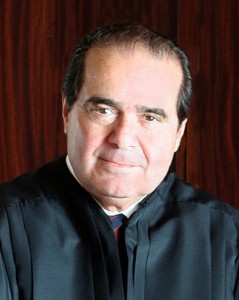
I promised that I would read two recent Supreme Court decisions, and write about them. This post is about Hollingsworth v Perry, deciding whether the 14th amendmentprohibits states from limiting marriage to a man and a woman.
I expected this decision to be short, simple and uninteresting, but I was wrong. This case highlights the tension between access to the courts, and the chaos that would ensue if there were no limits on that access. Both the majority and the dissent lays out strong arguments, but they did not decide anything about marriage. What they decided is that the case should not have gotten to them.
To understand, some background is required.
In May of 2008, the California Supreme Court found that limiting marriage to a man and a woman violated the California constitution. The proponents of the existing law started a drive toward referendum – Proposition 8.
Proposition 8 passed, but was immediately challenged in the courts. Because it was a California constitutional amendment initiative, it trumped the existing state constitution, and the challenges were, at first, on procedural grounds. When the California Supreme Court found that the initiative had been properly presented and passed, the opponents of Proposition 8 filed suit in Federal court.
Opponents found a sympathetic ear in judgeVaughn Walker, an open homosexual who arguably had a conflict of interest in the case owing to his admitted desire to marry another man. Judge Walker found that Proposition 8 violates the 14th Amendment. In his decision, he held that there is no rational basis for refusing marriage licenses to same-sex couples, and struck down Proposition 8 as a violation of the federal constitution..
At this point, an election intervened. The 2010 election replaced governor Arnold Schwarzenegger with Jerry Brown.
State officials have a duty to defend the laws of the state in the courts, regardless of whether or not they support them. Despite this, Governor Brown decided to refuse to defend Proposition 8 in federal court.
In my opinion, the idea that a governor can cause laws to be overturned by simply refusing to defend them should be offensive to every citizen. The duly enacted laws of the state are not optional. This is particularly true of constitutional amendments, which are part of the constitution governors (and presidents) take an oath to “protect and defend”. This failure to defend is dereliction of duty.
Without anyone defending the California constitution in federal court, the proponents of Proposition 8 asked the California courts to certify them as having “standing” in the federal courts. The 9th circuit court of appeals accepted this certification of standing, and accepted the case. They then ruled against those proponents on the merits, finding that judge Walker had ruled correctly.
All this sets up for the appeal to the US Supreme Court. There was a lot of speculation about what the SCOTUS would do with this case. Would they declare that the 14th amendment should overrule marriage law in all 50 states, or would they declare judge Walker to be wrong, and validate the marriage laws in all the states by affirming the right of states to legislate in this area?
The court took the case, but did not decide these questions. They decided by a 5-4 margin that the proponents of Proposition 8 did not have standing to defend it in federal court. Therefore all the judicial proceedings after the point where Governor Brown ceased to defend it were void. Judge Walker’s decision stood, and proposition 8 was struck down.
It is important to remember that in strict legal terms, this decision has very little impact outside California. Judge Walker’s decision only applies to his jurisdiction, so it has no legal impact on Minnesota, or Florida. It is also worth emphasizing that this decision is not a decision on the merits. The decision was simply a declaration that the court case should not have been brought to the SCOTUS.
I strongly encourage people to read the SCOTUS decisions. These decisions often contain a wealth of information about the thinking of the justices, and the many issues involved. In this case, the decision of the majority and the dissent (filed by those 4 justices who did not agree with the decision) are very, very interesting. Let me summarize.
The majority found that the only people who have standing to challenge or defend state laws are state officials. To do otherwise is to invite courts to settle questions where the judicial branch is not properly involved. Such intervention would make the courts another political branch. To allow the sort of “generalized injury” of a law one does not like to confer standing in a federal case is to invite chaos because everyone would have standing. In the words of the court, this does not constitute a “ticket to the courthouse”.
The dissent pointed out that the purpose of statewide initiative and referendum is specifically to bypass the officials who probably are opposed to the initiative. The dissenters found it outrageous for the court to declare that proponents have no standing because they have “no injury”. Besides, the California supreme court declared that the proponents did have standing, and it is improper for the federal court to overrule the decision of the state court choosing who should properly represent the interests of the state.
In conclusion, the decision was procedural, not on the merits. It does not declare anything about same sex marriage, or the 14th amendment. The decision is that non-state officials cannot defend state law in federal court. The decision was close, and the split of justices was unusual. (Scalia, Roberts, Ginsburg, Breyer, and Kagan in the majority, and Kennedy, Thomas, Alito, and Sotomayor in dissent)
I encourage my readers to read the decision here – Hollingsworth v Perry.
Next up, the DOMA decision – United States v Windsor.

